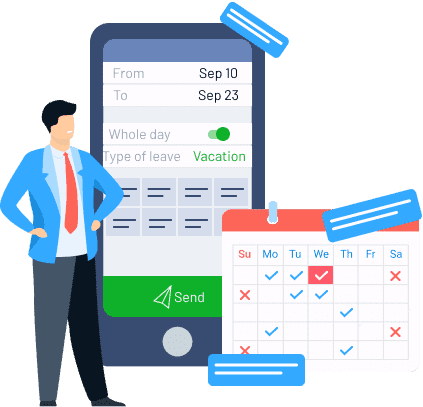The art of journaling, known as “keeping a diary,” is not new. Many of us would have done it in our school or college days. Some choose to keep a diary to log in everyday activities, while others may write it to release the emotional stress – people keep journals because they feel that there is something important enough in their lives to keep track of. However, one’s definition may differ from another’s perspective. Although many diaries are for personal satisfaction, others use them for business purposes, to maintain a historical record for posterity.
Keeping a work diary may seem a little “extra” for some. But keeping an old-school paper calendar or diary to track your professional activities and insights is a vital tool for both long-term and short-term planning at work. A work journal helps you see where your time went, help track progress on your goals, and serve as an incredible tool for preparing for your annual review. Let’s see how else you can benefit from keeping a work diary.

What Is Work Diary?
Work diary is a document where you register your thoughts, plans, actions, goals, achievements related to your job and career. Work journal can take a form of a paper notebook, an online file or a whole software.
To give you a better idea of what you can log into your work journal, let’s see two major types of entries:
- Reflective. These include assessing situations, your thoughts and actions to gain better insight into them and identify areas for improvement.
- Forward-looking. In these work journal entries, you share your goals and dreams regarding your current job or career as a whole.
Now that you know how to use a work journal, let’s see how you can benefit from keeping one.
Benefits of Keeping a Work Diary
1. Deepen Self-Reflection
Writing and nurturing a work journal is akin to meditation. You reflect on past mistakes to avoid repeating them in the future. Many find this type of reflection helpful in their personal lives: they reflect on the mistakes that they made when dealing with circumstances, situations, and people.
Sometimes they see journaling as an honest written self-assessment of situations known as alternative assessment, for anything you may have been involved in, including problems you encountered and the steps you took to solve them.
Work journal is often used in the workplace so that the incoming replacement will have an accurate idea of what to expect during job performance.
2. See Where Your Time Goes
You know those days – you reach the office to find out three meetings lined up – all flooded with interruptions followed by a team lunch, an emergency client email to respond to… and suddenly it’s 6 o’clock. Or maybe you have a month like that. Wondering where your precious time went?
An active practice of timekeeping in your work journal will help you see what you did with those 40+ hours each week. It gives you valuable insights on how you can improve time management and streamline going forward.
Keep a work diary successfully and efficiently, use a diary with daily pages that are divided up by the hour. This will help you write as you go about the day exactly what you are working on or what meeting you are attending by the hour.
3. Negotiate Raise Better
Your work journal will help you negotiate that next raise, promotion, or lucrative opportunity with ease. One of the most challenging and anxiety-provoking things about preparing for your annual review is the effort it takes to reflect on your past year and gather all relevant evidence before the meeting.
But with a daily diary chock-a-block full of the projects you’ve worked on, the people you’ve trained, or the times when you went above and beyond the scope of your essential job duties, you’ve just cut your time preparing in half.
By keeping detailed records throughout the year, you won’t have to stress so much – you’ll only need to sit down with a glass of wine, your diary, and your computer to start compiling a solid list of why you rocked it in the previous year.
Another great bonus of keeping a work journal – you’ll never stress about forgetting a project, a detail, or an accomplishment. If you’ve kept detailed notes and a steady record, you’ll find everything you will want to discuss with your boss in between the cover of your diary.
4. Improve Time Off Management
This benefit of keeping a work journal applies to those who are in charge of the organization and looking to create a friendly workplace. One way to do so involves providing flexible work timing, staying open to remote working options, creating nap rooms, setting up indoor sports centers, etc. While these options might not be feasible for every company, one trick will work for every organization out there: time off.
Millennials value their time off, so proper time off management will be an easy way to attract and retain them and using technology like leave management software is the best way to achieve this.
Keeping a work journal can work as a boon for implementing leave management software that allows every stakeholder to be involved in the process. When applied in combination with your work journal, such software can help you reap a range of benefits:
- It helps you see when it’s the right time to take vacation and plan your days off in advance.
- It eliminates unnecessary back and forth communication during the absence management process, making it streamlined and quick.
- As the stressful hassle of absence planning and requesting decreases, your job satisfaction is likely to improve.
- Plus, a web-based leave tracker is bound to boost management efficiency and reduce administration costs.

5. Stay Prepared for Prospective Interviews
In addition to discussing your job duties as listed on your freshly updated resume, the chances are that you’ll encounter some behavioral questions during an interview process. There are questions like, “Tell me about a time you showed leadership in a group setting,” or “Give me an example of a time you failed and how you addressed it.” You’re going to need specific anecdotes, and if you’re anything like me, being put on the spot makes your mind immediately flush itself of anything useful.
Keeping a work journal can abate this problem if you scan it before the interview – it will remind you of specific examples that you can arm yourself with before heading into an interview, where preparation and confidence go hand in hand.
Ready to Start Your Work Jornal?
Some professionals choose to maintain audio recordings of their activities, while others use social media such as Facebook. Moreover, several people are switching to online journaling apps like Lugelo for cohesive log management that blends text, images, audio, and videos.
The benefits of having a dedicated work journal offer an array of benefits ranging from pragmatic (increased organization and a sense of order) to financial (helping you negotiate a pay raise with ease) and even personal growth.
The year 2021 has just begun, and it is never too late to start something good. Pick up your favorite style – digital or physical and start journaling the professional work and experience the difference.
This post is contributed to actiPLANS by Musa Mawanda, Ph. D – the Founder and CEO of Lugelo, Inc., a mobile and web app for private journals, scrapbooks, biographies, and storybooks.




